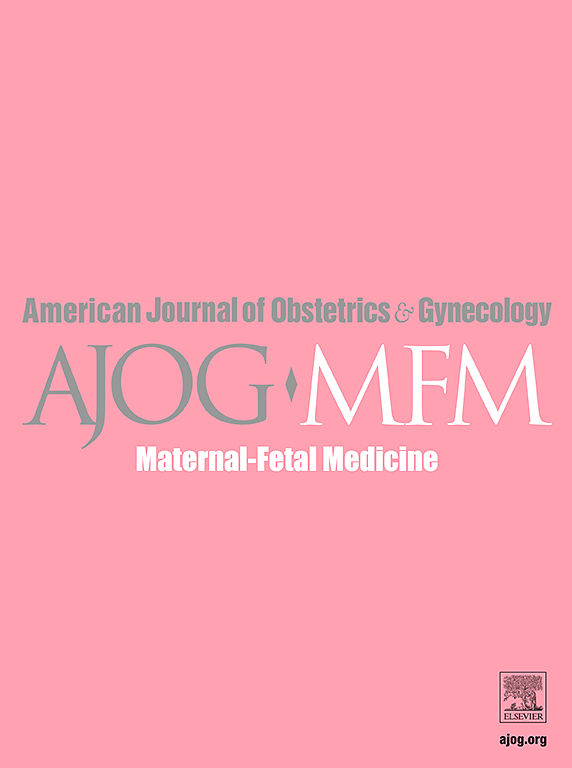孕期质子泵抑制剂对治疗子痫前期的影响及相关结果:系统回顾和荟萃分析。
IF 3.1
2区 医学
Q1 OBSTETRICS & GYNECOLOGY
American Journal of Obstetrics & Gynecology Mfm
Pub Date : 2024-10-01
DOI:10.1016/j.ajogmf.2024.101478
引用次数: 0
摘要
目的:这是一篇系统性综述:本系统综述评估了孕期服用 PPIs 对子痫前期及相关孕产妇、胎儿和新生儿结局影响的现有证据:数据来源:2023 年 11 月 17 日检索了五个电子数据库(MEDLINE、Embase、CINAHL、Cochrane CENTRAL 和 Global Medicus Index):研究评估和综合方法:采用随机效应模型对所有相关结果进行 Meta 分析。结果以风险比或平均差表示。使用 "偏倚风险2 "工具进行了质量评估,并完成了 "建议、评估、发展和评价分级"(GRADE)评估,以评价证据的确定性。该研究已在 PROSPERO(CRD42023423673)上注册:结果:我们的检索发现了 3,879 条记录,这些记录由两位作者独立筛选。有九份报告(描述了八项试验)符合我们的资格标准,但最终有六项试验被排除在我们的分析之外,因为妇女仅在剖腹产前立即服用 PPIs 以预防酸吸入。纳入荟萃分析的两项试验评估了 177 名确诊子痫前期妇女的治疗情况。在主要结果方面,中度确定性证据显示,使用 PPIs 对 HELLP 综合征(RR 1.21,95% CI 0.37 - 3.99,I² = 0%)或围产期死亡率(RR 0.81,95% CI 0.36 - 1.79,I² = 0%)的风险可能没有影响,而对所有其他主要结果(包括子痫和新生儿死亡率)进行荟萃分析的数据不足。没有试验研究了预防子痫前期的PPIs:鉴于结果数据有限,我们无法确定PPIs对子痫前期妇女的影响。需要进行更多试验,以确定 PPIs 对子痫前期的预防或治疗有哪些影响(如果有的话)。本文章由计算机程序翻译,如有差异,请以英文原文为准。
The effects of proton pump inhibitors during pregnancy on treatment of preeclampsia and related outcomes: a systematic review and meta-analysis
OBJECTIVE
This systematic review evaluated the available evidence on the effects of proton pump inhibitors during pregnancy on preeclampsia and related maternal, fetal, and neonatal outcomes.
DATA SOURCES
Five electronic databases (MEDLINE, Embase, CINAHL, Cochrane Central Register of Controlled Trials, and Global Medicus Index) were searched on November 17, 2023.
STUDY ELIGIBILITY CRITERIA
Randomized controlled trials of pregnant women who used any class or dose of proton pump inhibitor were eligible.
METHODS
A meta-analysis was conducted for all outcomes of interest using random-effects models. Results were presented as risk ratios or mean difference. Quality assessment was performed using the Risk of Bias 2 tool, and Grading of Recommendations, Assessment, Development, and Evaluations assessment was completed to evaluate the certainty of the evidence. The study was registered in the International Prospective Register of Systematic Reviews under identifier CRD42023423673.
RESULTS
Our search identified 3879 records that were screened independently by 2 authors. Nine reports (describing 8 trials) met our eligibility criteria, however, 6 trials were ultimately excluded from our analysis because women were only given proton pump inhibitors immediately before cesarean delivery for acid aspiration prevention. The 2 trials that were included in the meta-analysis evaluated the treatment of 177 women with diagnosed preeclampsia. For the primary outcomes, moderate-certainty evidence showed that the use of proton pump inhibitors likely has no effect on the risk for hemolysis, elevated liver enzymes, and low platelet count syndrome (risk ratio, 1.21; 95% confidence interval, 0.37–3.99; I²=0%) or perinatal mortality (risk ratio, 0.81; 95% confidence interval, 0.36–1.79; I²=0%), and there were insufficient data to conduct a meta-analysis on all other primary outcomes, including eclampsia and neonatal mortality. No trials investigated the use of proton pump inhibitors for the prevention of preeclampsia.
CONCLUSION
Given the limited outcome data, we are uncertain about the effect of proton pump inhibitors on women with preeclampsia. Further trials are required to determine what (if any) effects proton pump inhibitors might have for preeclampsia prevention or treatment.
求助全文
通过发布文献求助,成功后即可免费获取论文全文。
去求助
来源期刊

American Journal of Obstetrics & Gynecology Mfm
Medicine-Medicine (all)
CiteScore
7.40
自引率
3.20%
发文量
254
审稿时长
40 days
期刊介绍:
The American Journal of Obstetrics and Gynecology (AJOG) is a highly esteemed publication with two companion titles. One of these is the American Journal of Obstetrics and Gynecology Maternal-Fetal Medicine (AJOG MFM), which is dedicated to the latest research in the field of maternal-fetal medicine, specifically concerning high-risk pregnancies. The journal encompasses a wide range of topics, including:
Maternal Complications: It addresses significant studies that have the potential to change clinical practice regarding complications faced by pregnant women.
Fetal Complications: The journal covers prenatal diagnosis, ultrasound, and genetic issues related to the fetus, providing insights into the management and care of fetal health.
Prenatal Care: It discusses the best practices in prenatal care to ensure the health and well-being of both the mother and the unborn child.
Intrapartum Care: It provides guidance on the care provided during the childbirth process, which is critical for the safety of both mother and baby.
Postpartum Issues: The journal also tackles issues that arise after childbirth, focusing on the postpartum period and its implications for maternal health. AJOG MFM serves as a reliable forum for peer-reviewed research, with a preference for randomized trials and meta-analyses. The goal is to equip researchers and clinicians with the most current information and evidence-based strategies to effectively manage high-risk pregnancies and to provide the best possible care for mothers and their unborn children.
 求助内容:
求助内容: 应助结果提醒方式:
应助结果提醒方式:


